- Home
- Jennifer Donnelly
The Wild Rose Page 7
The Wild Rose Read online
Page 7
“No one here by that name,” the man said, not bothering to look up from the day’s racing sheet.
Max looked around. He knew what Madden looked like; he had a picture. He knew what Madden was, too: a thief with a boatyard—which was exactly what he needed. He inspected the faces in the room. Many had scars. Some ignored him, others eyed him insolently. He saw a woman, young, blond, and pretty—despite the faded bruises on her face—sitting alone by a window. Finally, he spotted Madden at the back, playing a game of solitaire, and walked up to his table.
“Mr. Madden, I’d like to speak with you,” he said.
Billy Madden looked up. He wore a bright scarf knotted around his neck and a gold hoop in one ear. A scar puckered his brow. His mouth was filled with decaying teeth. He was a large man, physically imposing, but most unsettling were his eyes. They were predator’s eyes—dark, soulless, and keen.
“Who the fuck are you?” Madden growled, his free hand going to a large flick knife on top of the table.
Max knew he would have to tread carefully. He’d been warned that Madden was violent and unstable. He wished he didn’t have to deal with him, but he had no choice. The boys from Cambridge were hot on the scent. He had to find some new way of evading them, and fast, or everything would be ruined.
“My name is Peter Stiles. I’m a businessman. I would like to make a deal with you,” he said, in a perfect London accent.
“You’re a dead man, is what you are,” Madden said. “You’ve a lot of bloody cheek. Maybe I’ll cut some off. Throw it in the river. Throw you in after it. What’s to stop me, eh?”
“A good deal of money,” Max said. “I need your help, Mr. Madden. I’m prepared to pay you well for it. If you kill me, we can’t do business.”
Madden sat back in his chair. He gave a curt nod. He kicked a chair out from under the table. Max sat down.
“I’ve heard you’ve a boatyard,” Max said. “I need a boat. A motorized one.”
“For what?” Madden asked.
“To take a man from London to the North Sea. To certain coordinates there. Every fortnight. I also need a man who can pilot that boat. A man who is well known to the river authorities, who has been seen coming and going on the Thames for years, and whose movements will raise no eyebrows.”
“Why do you need all this?”
“I have something that needs passing into other hands.”
“Swag?” Madden asked.
“I would prefer not to say,” Max said.
“If I’m risking my boat, and my man, I’ve a right to know,” Billy said.
“Jewels, Mr. Madden. Valuable ones. I need to get them out of England, to the continent,” Max said. He took his money clip out of his pocket, peeled off five twenty-pound notes from it, and laid them on the table. He rested his hand on top of them. “I’m prepared to make generous terms with you,” he said.
Madden’s small eyes lit up. He reached for the money, but Max did not release it.
“I’m paying you for your boat, your man, and your silence. Are we clear on this? If one word of this gets out, our deal is off.”
“I hardly go looking for publicity in my line of work. Your secret’s safe with me,” Madden said.
Max nodded. He pushed the money over to him. “This is a down payment only. My man will bring more each time. His name is Hutchins. He will be on the dock behind the Barkentine two weeks from tonight. At midnight. Have your man meet him here.”
Max stood up. He tipped his cap to Madden, then left. Madden was a grim and horrible man, and Limehouse a grim and horrible place. He was glad to be leaving both, but the meeting had been productive. Very productive.
He had something to pass into other hands, yes—but it wasn’t jewelry. And he needed a chain to do it. A strong, unbreakable one stretching between London and Berlin.
And tonight, the first link had been forged.
Chapter Seven
“Votes for women no?” Seamie said, reading aloud the words on a huge banner stretched across his sister’s dining room table. “That’s not going to help your case, Fee,” he added, as he kissed her cheek.
Fiona laughed. She had a needle in her hand and was bent over the banner, stitching. “I still have to add the W,” she said. “Get yourself some breakfast, Seamie, luv.”
“I think I will, thank you,” Seamie said, sitting down at the table. A maid was clearing dirty plates, smeared with egg and jam, where the younger children had been sitting. They’d just gotten up from the table and had run past Seamie in the hallway. Only Katie and Joe remained at the table.
“Good morning all,” Seamie said, but he got no response. Katie, her eggs untouched, her tea going cold, was shifting photographs around on a mocked-up layout of the Battle Cry. Joe, sitting at the head of the table, was writing furiously. The morning’s newspapers lay open on the table near him. Crumpled sheets of paper littered the floor all around him.
“Pass us those kippers, Joe, will you?” Seamie said, as he put his napkin in his lap. “Joe? Oi! Joe!”
Joe looked up, blinking. “Sorry, lad,” he said. “What is it?”
“Can I have the kippers?” Seamie said. Joe passed them over. “What are you doing?” Seamie asked him.
“Working on the speech I’m due to deliver in the Commons asking Parliament for more money for schools.”
“Will you get it?” Seamie asked, spearing a fish from the platter Joe had handed him.
“It’s doubtful,” Katie said, before Joe could reply and without looking up from her newspaper. “Mr. Churchill’s speaking, too. Right after Dad. He wants more boats and he has a good deal of support for them from both benches. Germany’s saber rattling has many in England eager to build up our military. Calls are being made for monies to fund a new fleet of dreadnoughts and Dad thinks they’ll be heeded—based on precedent. Five years ago, Lloyd George tried to cut naval spending—back when he was chancellor of the exchequer—and was roundly defeated.”
Seamie shook his head, laughing. “Is that so, Kitkat?” he said, calling Katie by a nickname he’d given her—one that he knew she hated. “Don’t you ever talk about anything other than politics? You’re fifteen years old, and a girl, for goodness’ sake. Don’t you ever talk about dances or dresses or boys?”
Katie looked up at him, narrowing her eyes. Seamie laughed. He liked to spar with her.
“You really oughtn’t to tease her,” Fiona said, still stitching. “She gives as good as she gets. You know that.”
“Come on, Kitkat,” Seamie said, not heeding his sister’s warning. “I’ll buy you a new dress. From Harrods. A frilly pink one with bows on it. And a hat to match. We’ll go today.”
“Yes, let’s,” Katie said, smiling like a shark. “And while we’re there, let’s buy a suit, too. For you, Uncle Seamie. A gray worsted cut nice and tight with miles of buttons. We’ll get a tie, too. To keep your shirt collar nice and tight around your throat. Just like a noose. Today a desk job at the RGS, tomorrow a nice little wife who’ll darn your socks for you, and next week a semidetached in Croydon.” She sat back in her chair, crossed her arms over her chest, and started humming Chopin’s Funeral March.
“Tomboy,” Seamie said, bested and genuinely annoyed by it.
“Pencil pusher,” Katie retorted.
“Hoyden.”
“Office boy.”
“I haven’t even taken the job yet!” Seamie said defensively.
“Oi, you two!” Joe said. “That’s enough.”
Seamie, still glowering—for Katie had touched a nerve—speared himself a broiled tomato from a platter.
“I warned you,” Fiona said to him.
“Can you take me to the Clarion’s printing presses tomorrow afternoon, Uncle Seamie? Please? I need to get the next edition of the Battle Cry printed and Mum and Dad are busy and they won’t let me go alone,” Katie said.
“I don’t see why I should,” Seamie said, huffily.
Katie smiled again. It was a real smile t
his time, broad and engaging. “Because you’re my uncle and you love me to bits,” she said.
“Did,” Seamie said. “I did love you to bits.”
Katie’s face fell.
“Oh, I’m just joking. Of course I’ll take you,” Seamie quickly said. He couldn’t stand to see her sad, even if she was just putting it on.
“Thank you, Uncle Seamie!” Katie said. “I was just joking, too. You’d never take that job, I know you wouldn’t. And you’d never move to Croydon, either.”
Katie went back to her paper. Joe continued to write, Fiona to stitch. The younger children’s voices carried to Seamie from another part of the house—they were shrieking and laughing and undoubtedly having fun.
Seamie stopped piling food on his plate and looked at them—Fiona, Joe, and Katie. He was happy, being here with his sister and her family, but it struck him now that it was her family, not his. As much as they loved him, and as much as he loved them, he was an uncle—not a father, not a husband. And he had never felt that distinction as keenly as he did right now. He had no idea why. Perhaps it was Katie teasing him about having a little wife who would darn his socks. She was right, of course—he wouldn’t take the RGS job, much less move to Croydon—but as he looked at his sister and her family—together around the table, busy and contented, always happy to spend time in one another’s company—he wished, just for a moment, that he had someone in his life who could make him want to move to Croydon. An image of Jennie Wilcott popped into his head, but he quickly pushed it out again. Connecting her to this odd, uncharacteristic longing for domestic bliss was madness; he barely knew her.
“Give us a paper, will you?” he suddenly said to Joe, wanting to dispel his strange mood.
Joe handed him one. Seamie spread it out next to his plate, picked up his fork, and glanced at the headline. KAISER’S DREADNOUGHT LAUNCHED, it read. And below it, CHILL WIND BLOWS ACROSS BELGIUM AND FRANCE.
Neither the ominous headline nor the story that followed it did anything to dampen Seamie’s appetite. He was starving. He added broiled mushrooms, bacon, poached eggs, and buttered toast to the herring and tomato already on his plate, then poured himself a cup of tea. It was an Assam, bright, brick red, and strong enough to bring the dead back to life. He needed that. George Mallory was in town. They’d gone out on a pub crawl last night and he hadn’t gotten home until three A.M.
It was nine o’clock now on a clear and crisp March Saturday. Seamie was spending a long weekend with Joe and Fiona at their Greenwich estate. Easter was only a month away, and Fiona had come out especially to check on the progress the painters were making. She had invited fifty people for Easter dinner and wanted several rooms freshened up before the holiday.
“The post, madam,” Foster said now, placing a silver tray piled high with letters on the table.
“Thank you, Mr. Foster,” Fiona said, not bothering to look up from her work.
“I believe that a missive from California is included among the invitations and tradesmen’s bills, madam. I believe the cancellation reads Point Reyes Station.”
“Point Reyes? How wonderful!” Fiona said. She put her needle down, dove into the mail, and fished out a large, stiff envelope.
“How are the painters faring, Mr. Foster?” Joe asked.
“Quite well, sir. They’ve finished in the drawing room and have moved on to the foyer.”
“Oh, Joe! Seamie! Look!” Fiona said with emotion. “India’s sent us a beautiful likeness of herself, Sid, and the children. How lovely they are!”
Seamie snorted. “Our brother? Lovely?” he said.
“Well, his children are,” Fiona said, laughing. “Just look at Charlotte. What a beauty. And the baby. And Wish, who looks just like his father.” She paused for a few seconds, then softly said, “And ours.”
Seamie tried to read his sister’s expression as her eyes traveled over the images in the photograph. He saw love in it, and happiness, and loss.
He knew she still grieved for their parents. Their father, Paddy, had been killed back in 1888 at the docks where he worked. His death had looked like an accident, but it had been the work of his employer, William Burton. Paddy, a union organizer, had been trying to get his fellow dockers at Burton Tea to join the dockworkers union. Burton, together with an East London thug named Bowler Sheehan, had arranged the so-called accident to put an end to Paddy’s unionizing. And Kate, their mother, had been murdered the same year by a madman known as Jack the Ripper.
Their baby sister, ill and weak, had died shortly thereafter. And then they’d lost their brother Charlie. He hadn’t died. He’d been driven mad by the sight of his mother dying in the street by their house. He’d run away, and then killed another lad in self-defense. Too afraid to return to his family, he’d taken the dead boy’s name—Sid Malone—and descended into a life of crime.
Years later, Fiona had met up with him again. They had a falling out, and Sid disappeared back into the dark streets of East London. Heartbroken over what he’d become, Fiona made the decision never to tell Seamie what had really happened to the brother he’d loved.
He had found out anyway, though—years later, in the most horrible way. Joe, the newly elected MP for Whitechapel, had sought out Sid, to warn him to stay on the straight and narrow or there would be consequences. Joe hadn’t been able to see Sid, but he’d seen his henchman—Frankie Betts. They got into a terrible fight, and Frankie, worried that Sid would desert him and the other hard men who worked for him, had shot Joe and blamed the shooting on Sid—hoping to make it impossible for him to return to the straight world.
Sid, on the run and wounded by a detective’s bullet, had come to Fiona’s house late one night to tell her that he hadn’t shot her Joe. She’d taken him in and hidden him until it was safe for him to get out of London. He’d gotten himself hired on the first ship he could find, a cargo ship bound for Africa. He’d left everything behind: his life, his family, and the woman he loved—a young, aristocratic doctor named India Selwyn Jones. He’d left her because he believed she’d abandoned him to marry a man of her class—a corrupt and heartless politician named Freddie Lytton. India only married Freddie, however, because she believed Sid was dead, and because she was carrying Sid’s child and wanted a father, if only on paper, for that child.
Sid and India met again in Africa. Sid was living there under an assumed last name—Baxter—and Freddie, a rising star in the Colonial Office, had been sent there on government business. When he realized that Sid was still alive, he had him arrested and thrown in jail, in hopes of having him hanged. And then Freddie had nearly killed both India and the child—a girl named Charlotte—by abandoning them in the African bush. He’d been killed himself, however, by hyenas as he was on his way back to the bungalow where they’d all been staying. With Seamie’s help—for he had been in Africa himself at the time, at Kilimanjaro—Sid escaped from jail, barely in time to save India and Charlotte. He brought them to safety, and then, still fearing arrest, he rode off, leaving them with only a note telling them to meet him in America, in California, where India owned land. They would begin again there. He promised them that. At Point Reyes on the coast, where he and India had once dreamed of going, where the sea met the sky.
“I wouldn’t believe it if I wasn’t seeing it,” Seamie said now, as Fiona handed him the photograph. He looked at the faces of the beaming children, the beautiful woman, and the man, tanned and smiling. “Our brother—married, happy, and raising cows.”
“Steers,” Joe said.
“Cow, steers … does it matter? I couldn’t be more surprised if he was raising daffodils,” Seamie said.
“He’s so fortunate,” Fiona said. “To have survived that journey, all those miles across Africa, and then the passage to New York, and the trek to the west.”
Seamie nodded. He remembered waiting desperately for news of his brother. They had all waited, and worried, and suffered, for the better part of a year, until finally they’d had a letter from India i
n Point Reyes telling them that Sid had come home to her and Charlotte, and that he was all right. Or would be, in time.
He had journeyed west across the entire continent of Africa with a horse and little else—including little money. He’d had his gun with him and so was able to hunt his food. His horse grazed. And water was free wherever he could find it. Halfway across, he’d come down with malaria. Tribesmen found him and doctored him. He pulled through, and when he got his strength back—about a month later—he continued on to Port Gentil. There, he sold his horse and worked the docks until he’d saved up enough money for a passage to New York. He worked the docks again when he arrived in the States, this time in Brooklyn, until he’d earned enough money for train fare to San Francisco.
He almost made it, too, but he was coshed and robbed in Denver one night as he made his way to a cheap hotel where he’d planned to spend the night before catching a train west the next morning. He’d had to hunt for work again and found it in a slaughter yard. He worked there for two months, and nearly had his fare earned, when he was injured. A steer got loose, trampled him, and broke his leg. A man in the tenement where he lived—an orderly at a pauper’s hospital—set his leg to save him the doctor’s fee, which was why he walked with a cane. He’d gotten five dollars out of the yard’s foreman. That, together with the money he’d saved, got him to San Francisco, and then up the coast. He’d arrived at Point Reyes with forty-six cents in his pocket.
Seamie had asked him once, in a letter, if he’d ever had a moment where he wondered if he should be making the journey. He hadn’t spoken to India since he deposited her, half-delirious, back at the bungalow in Kenya, where she had been staying. What the hell would he have done if she hadn’t been there?
Sid wrote back that the thought had never crossed his mind. Of course she’d be there. And he’d have made a hundred such journeys, if that’s what it took to get to her and Charlotte.
“I know some people might think I’m mad,” he wrote. “But I’m not, I’m lucky. So bloody lucky.”

 Rogue Wave
Rogue Wave Waterfire Saga, Book One: Deep Blue (A Waterfire Saga Novel)
Waterfire Saga, Book One: Deep Blue (A Waterfire Saga Novel)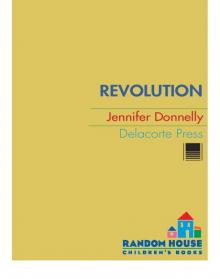 Revolution
Revolution The Wild Rose
The Wild Rose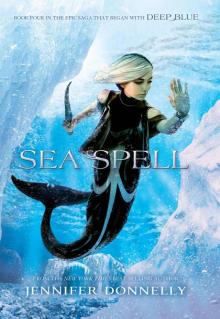 Waterfire Saga (4 Book Series)
Waterfire Saga (4 Book Series)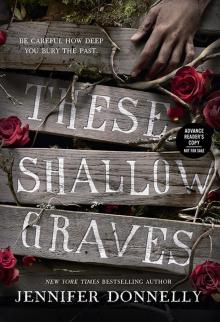 These Shallow Graves
These Shallow Graves Beauty and the Beast: Lost in a Book
Beauty and the Beast: Lost in a Book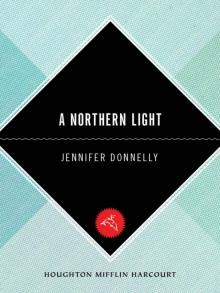 A Northern Light
A Northern Light The Tea Rose
The Tea Rose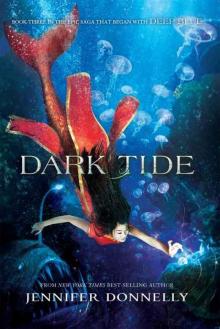 Waterfire Saga, Book Three: Dark Tide: A Deep Blue Novel
Waterfire Saga, Book Three: Dark Tide: A Deep Blue Novel The Winter Rose
The Winter Rose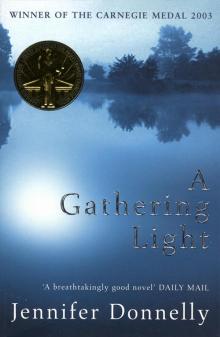 A Gathering Light
A Gathering Light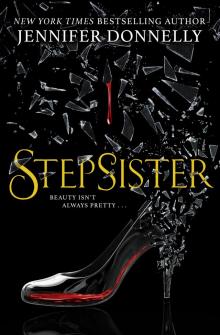 Stepsister
Stepsister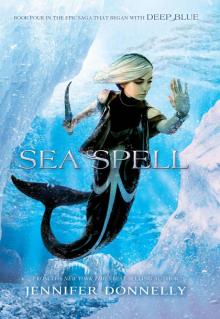 Waterfire Saga, Book Four: Sea Spell: Deep Blue Novel, A
Waterfire Saga, Book Four: Sea Spell: Deep Blue Novel, A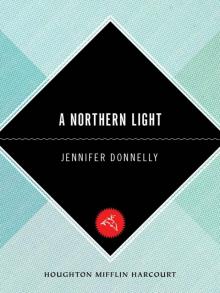 Northern Light
Northern Light Winter Rose, The
Winter Rose, The